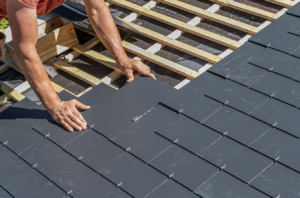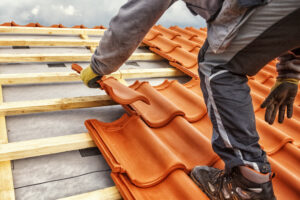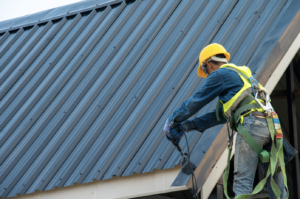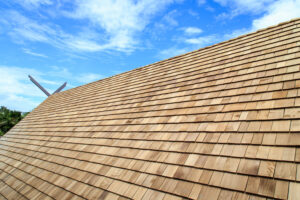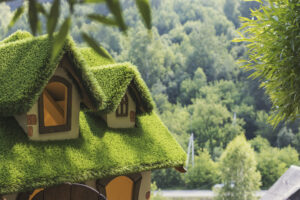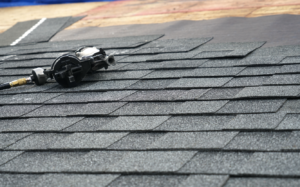If you want a good quality burger, you don’t go to McDonald’s. If you want a lasting roof, you don’t go to an inferior contractor who uses second-rate materials.
To help you become more familiar with the many roofing materials available we’ve compiled a list of the best—their pros and cons, and cost. This guide will help you compare and contrast them to choose the best material for your lasting roof. (Installation cost will, of course, vary by contractor.)
Slate
Slate is one of the highest quality roofing materials on the market. Not only does it look elegant, it can also potentially last for 100+ years.
Pros
- Longevity – Lifetime of 150+ years when properly installed.
- Appearance – Timeless in beauty, and comes in a variety of colors, thicknesses, and shapes.
- Natural – Made of natural resources which contribute to its longevity and is eco-friendly.
- Fire Resistant – This feature helps protect the home from nearby sparks, wildfires, or fireworks.
- Durability – One of the strongest materials, it can withstand both time and weather.
Cons
- Weight – Heavy, so your home will need the proper support to hold the weight.
- Maintenance – Fragile, so avoid stepping on it. If a piece from your roof chips away, it’s hard to replace.
- Installation – Difficult to install. Make sure your contractor has experience working with and installing slate.
Cost
Average range: $500-$1,700 per square. Though slate roofs are notoriously expensive, they can last ten times longer than the average roof.
Clay/Concrete
Clay or concrete roofs have a life expectancy between 50-100 years. While not the same material, they are similar enough to be grouped together.
Pros
- Longevity – Can last for up to a century.
- Appearance – Have an impressive overlap display and come in a variety of shapes and colors.
- Natural – Tiles are made from natural sources making them environmentally friendly
- Durability – The color of clay roofs won’t fade and are more likely than concrete roofs to reach a 100 year lifespan.
Cons
- Weight – Heavy, so your home will need the proper support to hold the weight.
- Installation – If installed by a contractor who’s experienced with the material, the roof will last longer.
- Maintenance – Fragile and crack easily so avoid stepping on them. However, unlike slate, cracked tiles are easy to replace.
Cost
Average range: $150-$600 per square.
Metal
There is a concern among homeowners that the sound of severe weather will be intensified by a metal roof. However, if the installation is done properly, the level of sound is equivalent to any other roof type.
Pros
- Longevity – Can last between 40-80 years depending on the metal type and installation.
- Appearance – Comes in a variety of shapes, colors, and styles, making it easy to fit into your home’s aesthetic.
- Weight – Extremely lightweight in comparison to slate or clay/concrete.
- Fire Resistant – This feature is leading to increased popularity in areas prone to wildfires.
- Durability – Very durable against the elements in most climates.
Cons
- Maintenance – Some metals are susceptible to denting or rusting.
- Installation – While installation is often relatively quick, if not done by a professional, metal roofs are likely to leak, dent, rust, and chip.
- Natural – Metal is not easily biodegradable.
Cost
Average cost: $150-$900 per square.
Wood
To incorporate the charming look of wood into your home you needn’t convert it into a log cabin. Wood roof shingles will do the trick.
Pros
- Longevity – When well-maintained, can last up to 50 years.
- Appearance – Come in a variety of shapes and colors that emulate natural beauty .
- Weight – Lightweight.
- Durability – If well-cared for, are very durable against the elements.
- Natural – Perhaps the most biodegradable option, as they literally come from trees.
Cons
- Maintenance – Need to be cleaned and treated regularly to prevent leaking, infestations, and rot.
- Installation – If installed correctly and if proper sealants are used, maintenance issues can be avoided.
- Fire Resistance – Highly susceptible to fire.
Cost
Average cost: $250-$600 per square. Additional costs for treatments.
Green
A green roof is purposefully covered in vegetation and/or gardens. These can last anywhere between 5-50 years—the trick is in the upkeep.
Pros
- Longevity – A well-maintained green roof can offer a substantial lifespan of 30-50 years.
- Appearance – Covered by shrubs, flowers, vegetables, and more, making for a truly natural look.
- Natural – The most environmentally friendly option.
- Durability – Strengthens the inner membrane and waterproofing features of a roof.
Cons
- Maintenance – The lifetime decreases if not well-cared for and maintained.
- Installation – Not easy to install. Support and maintenance systems are required.
- Durability – Improper installation and maintenance will result in low sustainability.
Cost
Average cost, depending on intensity: $1,000-$3,000 per square (installation taken into account).
Asphalt
The most common roofing material, asphalt shingles, often reaches the 20 year mark before needing to be replaced. A platinum contractor may offer a 50 year warranty for a higher price.
Pros
- Longevity – Can last between 40-50 years.
- Appearance – Has the most versatile options for colors, patterns, shapes, sizes, and thicknesses.
- Durability – Highly durable—can withstand the elements—which is why 80% of American homes use asphalt.
- Installation – Relatively easy to install and homeowners themselves can often repair a chipped shingle or two.
Cons
- Longevity – The cheaper the materials, the shorter the lifespan.
- Installation – A professional, experienced contractor and quality materials will ensure maximum life-span.
Cost (Most budget friendly)
Average cost: $70-$200 per square.
Conclusion
A homeowner’s goal should be for a reroofing to remain viable for the foreseeable future. .
Expect a roof installation to cost anywhere between $5,000-$120,000 depending on the contractor you hire, their experience, what materials are used, and the warranty.
Find a contractor with great reviews, recommendations, and experience to ensure that you achieve your goal of a roof that will last a lifetime.
